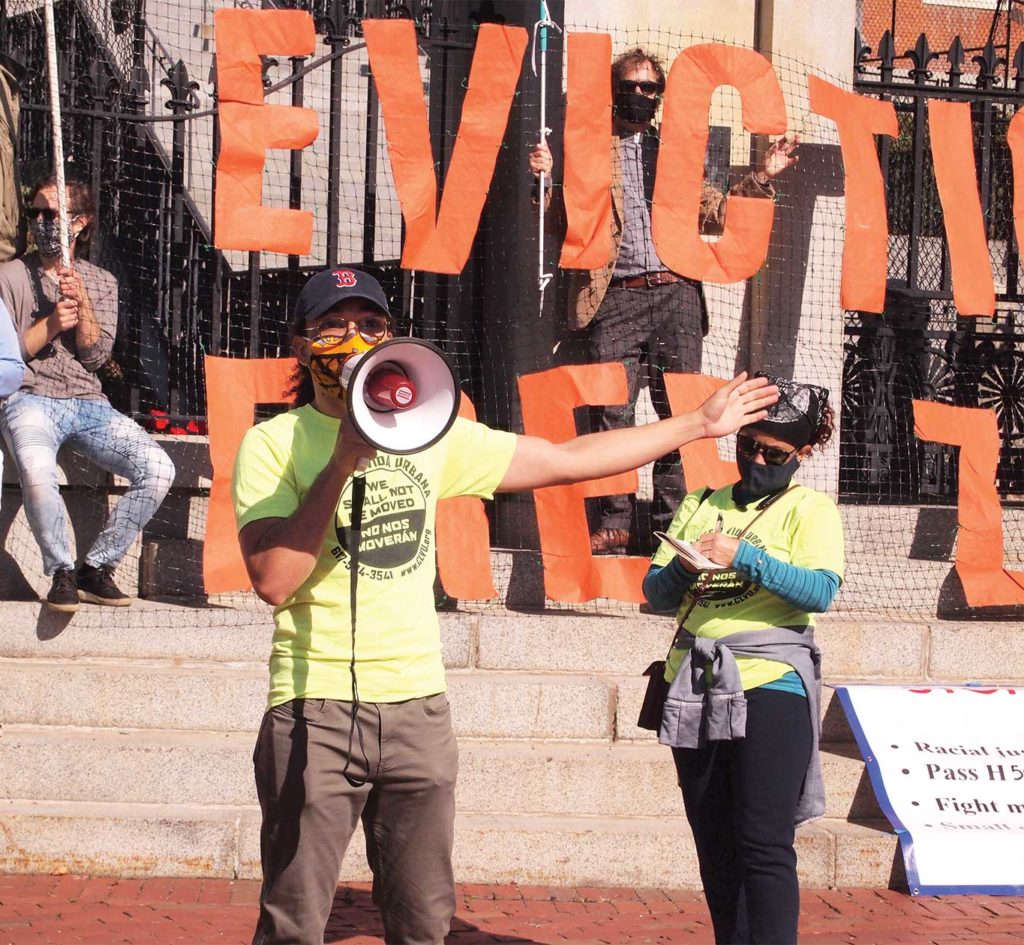Last-minute push for eviction protections
Activists, lawmakers concerned Baker’s plan falls short of needs

Gov. Charlie Baker’s new Eviction Diversion Initiative, which promises $171 million in total aid, some of which has already been allocated, is receiving backlash from activists and legislators. While demonstrators with City Life/Vida Urbana were marching to the State House on Thursday, Oct. 15, House representatives were inside discussing alternatives with Rep. Mike Connolly in an informal session.
The statewide moratorium on evictions, spurred by the coronavirus pandemic, ended last Friday, allowing landlords to begin sending notices to quit. According to a recent WBUR investigation, however, illegal evictions were happening up until the end of the moratorium.
Alex Ponte-Capellan, one of the organizers with City Life/Vida Urbana, says his organization has received over 2,000 calls in the past few months from residents seeking help with a possible eviction. Organizers have been connecting callers with legal assistance and financial assistance through RAFT, the fund for homeowners and families to which the governor’s Eviction Diversion Initiative just allocated an additional $100 million.

Demonstrators with City Life/Vida Urbana march to the front steps of the State House PHOTO: MORGAN C. MULLINGS
“Right now, the reason why people are calling is because people have lost their jobs and can’t afford rent,” Ponte-Capellan said in an interview after last week’s State House demonstration.
The group marched from Boston Housing Court around the corner to the State House, taping signs to the sidewalk that read “Connect the dots,” to highlight the cause-and-effect of the state’s inaction.
“We started a new database where we’re recording all of the new cases that we’ve gotten, and we’re following up on a lot of those cases. But the vast majority of those cases are still waiting to hear back from RAFT,” said Ponte-Capellan.
Though many have been calling for an extension to the eviction moratorium up to this point, Ponte-Capellan is more focused on the direct assistance promised by the proposed Housing Stability Act that advocates have been pushing for since June.
“The moratorium isn’t the solution. It’s just holding back the waters, like a levee,” he said. Giving renters more time to come up with an agreement with their landlord, and landlords more money to make mortgage payments, he said, is the most comprehensive solution.
On Wednesday, Oct. 14, City Life/Vida Urbana, Homes for All Massachusetts, Right to the City Boston and more marched from Red Rock Park in Lynn to the governor’s house in Swampscott, demanding he sign a pledge to pass the Housing Stability Act. According to Right to the City organizer Andres del Castillo, state troopers at the governor’s home would not allow demonstrators to leave the document there.
“It’s essentially a surrender on his part, to the future of Massachusetts tenants and homeowners, because he’s saying, ‘There’s an eviction crisis coming, so let’s hire more judges. Let’s expand the eviction infrastructure,’” del Castillo said. This facet of the governor’s Eviction Diversion Initiative — adding judges to process the increased amount of eviction cases — is one of many pieces under scrutiny.
Connolly made a move the next day to extend the moratorium again, this time to give more time for the governor’s assistance to take hold. He told WBUR that he filed an emergency petition that would halt evictions until Jan. 1, 2021, but it was unsuccessful, since the House hasn’t had a formal session in two-and-a-half months.
While activists have been consistently calling, marching, and spreading the word about the wave of evictions, del Castillo also pointed out that there is a non-political fight on the horizon.
“Once the 17th hits, we need to also brace for what it’s going to look like on the ground,” he said. “We’re going to have to respond to the direct needs of our communities.”


![Banner [Virtual] Art Gallery](https://baystatebanner.com/wp-content/uploads/2024/04/Cagen-Luse_Men-at-store-e1713991226112-150x150.jpg)



